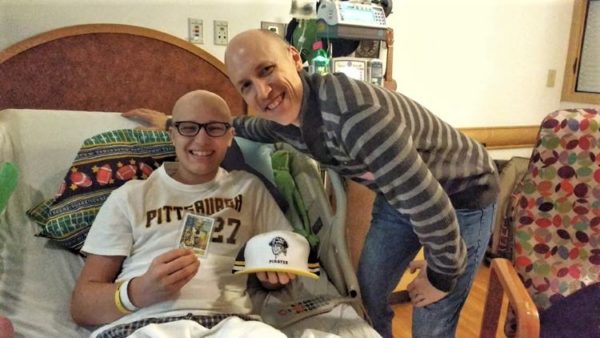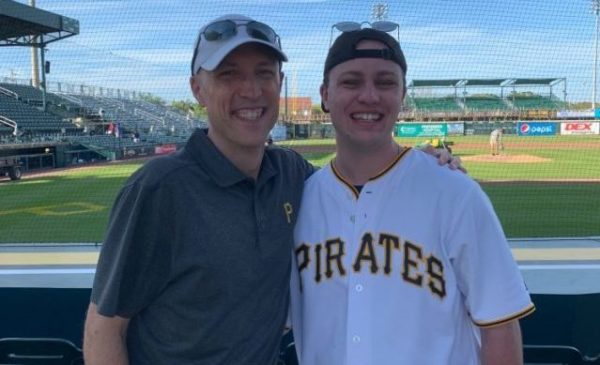
Connecting Champions matches kids with cancer to mentors in their dream jobs
Photo: Sean Nolan and Joe Block.
This story was first published in NEXTpittsburgh, which publishes Kidsburgh.
When Sean Nolan was 15 years old, he went to bat against cancer.
The baseball fan had aspirations to be a sports broadcaster. Through Connecting Champions, a Pittsburgh-based nonprofit, he was able to get career advice from an expert.
The organization, which asks young cancer patients “What do you want to be when you grow up?” — and then pairs them with a mentor — connected Sean with Joe Block, a TV and radio play-by-play broadcaster for the Pittsburgh Pirates.
A 21-year veteran of the industry, Block was more than happy to share his knowledge. “I don’t fancy myself as a celebrity,” he says. “I really wanted to just be somebody that could cheer him up and take his mind off of things for a bit.”
Before the COVID-19 pandemic, Block met with Nolan at UPMC Children’s Hospital of Pittsburgh to discuss every aspect of the baseball field. Sean even sat in the broadcast booth during a game and was able to put Burkitt’s lymphoma on the back burner.
“I first met Joe during my third round,” says Nolan, of West View. “I was supposed to be there for one week, but I was having fevers, so it turned into two. And it was Christmas time so I was feeling really down. Joe walked in and he was bald just like me. We just sat there for two hours. It was really cool to hear his whole story. He was real with me, too. He said, ‘Sean, there are 60 people in the whole world with my job. If you play your cards right, and with a little luck, anything is possible.’”
Now 19 and cancer-free, Nolan attends Robert Morris University, where he’s studying communications.

Sidney Kushner, executive director of Connecting Champions, says watching children flourish and friendships blossom are the most rewarding parts of his job.
The Upper St. Clair native founded the organization in 2010 in honor of a friend who died from cancer. As a freshman attending Brown University in Rhode Island, Kushner started volunteering at a local children’s hospital.
“I’d ask kids what they wanted to be and their eyes would light up,” he says. “You could tell that, in that moment, they totally forgot about having cancer.”
He became more entrenched in patients’ lives and the medical community and decided to start a pilot version of Connecting Champions at Children’s Hospital of Pittsburgh. By his senior year, it was his full-time occupation. Today, the majority of child cancer patients in the region are referred to the program.
Kushner and his team do more than generate feel-good stories; their work is evidence-based and outcomes-driven, helping children overcome severe social isolation, reach developmental milestones and focus on what comes after cancer.
“About 84 percent of patients survive cancer medically, but two-thirds have mental and emotional side effects during treatment and beyond,” he says. “There is a need for long-term social support now more than ever.”
Since its inception, Connecting Champions has linked 250 kids and mentors and expanded to five other children’s hospitals across the country. Participants, who range in age from 3 to 22, have expressed interest in professions such as ghost hunting, law, culinary arts, clowning and dog sled racing. Kushner not only finds an adult who shares a child’s professional interests but fits their personality as well.
COVID-19 forced the organization, which relies heavily on face-to-face interactions, to go virtual.
Kids receive care packages from their new pal with activities and fun for them to enjoy together over a digital platform such as Zoom or Skype. One mentor helped an 11-year-old fashionista design a dress. If children are uncomfortable with live video chatting, their mentor can send a prerecorded video.
Connecting Champions has a Mentor Selection Committee, but Kushner says a lot of people reach out to offer their expertise. On average, it takes about four weeks to forge partnerships. Connecting Champions then facilitates weekly or monthly interactions for at least six months. Some friendships are still going strong after five years.
Block and his family have formed a special bond with the Nolans. And although he’s the one doling out advice, he feels he’s learned more from his mentee.
“Sean has a special kind of resilience and strength,” Block says. “He is exceptionally optimistic and that really opened my eyes. He reminds me that the game of baseball is fantastic and I should never lose my enthusiasm for my job.”